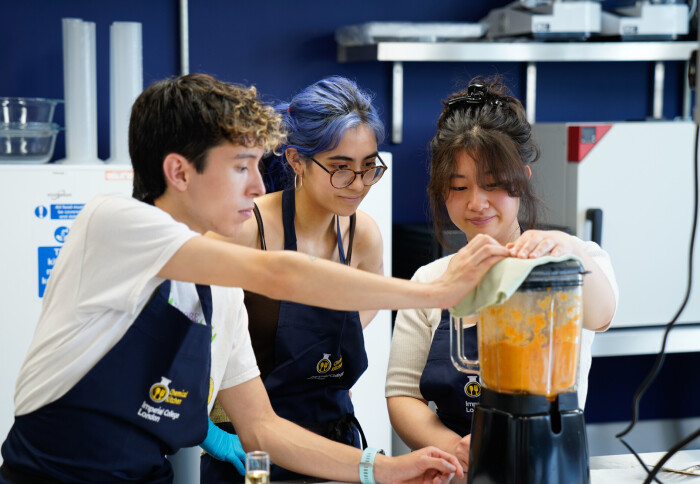Chemistry Secures £31k to Expand World of Food Workshop for Equality & Inclusion

The Department of Chemistry has recently secured £31k to relaunch World of Food Workshops for staff and students.
The Department of Chemistry recently secured £31k from the President’s Excellence Fund for Learning and Teaching Innovation and aims to extend its successful pilot of World of Food workshops. This initiative will foster diversity and inclusivity within the Faculty of Natural Sciences and beyond.
 Driven by Dr Jakub Radzikowski and his team, the workshops will promote cultural understanding and appreciation as a pivotal step towards combating racism. Participants will engage in hands-on cooking sessions, exploring cuisines from various cultures in the state-of-the-art Chemical Kitchen facility.
Driven by Dr Jakub Radzikowski and his team, the workshops will promote cultural understanding and appreciation as a pivotal step towards combating racism. Participants will engage in hands-on cooking sessions, exploring cuisines from various cultures in the state-of-the-art Chemical Kitchen facility.
The Chemical Kitchen, launched in 2019, is an innovative teaching and learning project which aims to teach skills and approaches to learning through transdisciplinary simulation utilising the parallels between professional gastronomy and STEMMB. Dr Radzikowski, a Culinary Education Designer, plays a pivotal role in leading this innovative course.
'I’m very excited for the opportunity to empower our students and colleagues to showcase personal stories about their culture and food in the Chemical Kitchen. This will give the Imperial community the opportunity to collaboratively widen our horizons and celebrate our diversity.' Dr Jakub Radzikowski
The leadership team, comprising Ingrid Kedissa and Dr Jakub Radzikowski, along with Dr Mark Anderson from the Centre for Higher Education Research and Scholarship (CHERS), will oversee the programme’s educational research component, measuring the effectiveness and impact of the workshops.
Recognising the importance of inclusivity, the organising team is committed to employing explicitly de-colonial approaches. Central to this is prioritising participant narratives over authoritative imposition of content, thus enhancing cultural literacy and countering stereotypes.
This funding will enable the delivery of 10-12 workshops in a two-phase approach, beginning with a broader audience within the Faculty of Natural Sciences. Lessons learned from the initial phase will inform the refinement of the workshop model, preparing it for wider dissemination across the college in phase two.
approach, beginning with a broader audience within the Faculty of Natural Sciences. Lessons learned from the initial phase will inform the refinement of the workshop model, preparing it for wider dissemination across the college in phase two.
In addition to physical workshops, the department plans to leverage digital platforms and collaborations with Taste Imperial to extend the reach of the initiative. Workshop materials will be published online, and videos will be shared with the wider community. Online cook-a-longs and partnerships with Taste Imperial will further enhance accessibility and engagement.
Through this multifaceted approach, the Department of Chemistry aims to embed principles of equality, diversity and inclusion into the fabric of Imperial College London. By fostering a culture of curiosity, mutual appreciation and respect, the initiative seeks to create an environment where all members of the community are empowered to explore, learn and celebrate their cultural identities.
Article text (excluding photos or graphics) © Imperial College London.
Photos and graphics subject to third party copyright used with permission or © Imperial College London.
Reporter
Saida Mahamed
Department of Chemistry